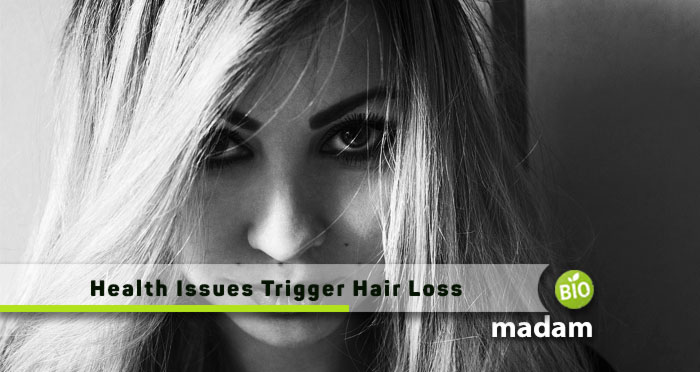Millions of people throughout the world struggle with hair loss, which is a widespread problem. While there are many causes for this illness, some health problems can seriously exacerbate it. For accurate diagnosis and therapy, it’s essential to comprehend the underlying factors that contribute to hair loss and are linked to particular medical disorders. This article examines the connection between several medical diseases, conditions, and hair loss, illuminating the causes of this occurrence. We seek to shed light on this complex problem by exploring the various mechanisms that link these illnesses to hair loss.
Autoimmune Illnesses
Due to the immune system wrongly attacking hair follicles, some autoimmune illnesses can cause hair loss. Patchy hair loss is the hallmark of the common autoimmune disorder alopecia areata. The immune system attacks the hair follicles in this disorder, resulting in inflammation and hair loss. In these circumstances, obtaining expert advice from recognized hair transplantation clinics like the Austin Hair Clinic can provide people with practical options to address the causes of their hair loss and regain their confidence. Systemic lupus erythematosus (SLE), another autoimmune condition, can cause alopecia or hair loss. Immune dysregulation and genetic factors are thought to play a part in the exact mechanisms by which autoimmune illnesses cause hair loss, however, this is still a subject of ongoing research.

Telogen Effluvium
A typical reason for transient hair loss is telogen effluvium, which can be brought on by many medical conditions. When a large number of hair follicles reach the telogen (resting) phase at the same time, the condition results in excessive hair loss. Physical injury, surgery, serious sickness, hormone imbalances, and mental stress are a few causes. The body’s reaction to these stressors interferes with the regular cycle of hair growth, which leads to hair loss. Hair growth usually restarts when the underlying health problem has been addressed.
Unbalanced Hormones
The most prevalent causes of androgenetic alopecia, or the loss of hair, are excess androgens, or sex hormones for men, and hormonal imbalances. Both male and female pattern baldness are influenced by androgens. Androgens may cause excessive hair loss in female-pattern bald patients by weakening the hair follicles in those patients. When estrogen levels alter as a result of using birth control or going through menopause, androgen sensitivity may get worse.
Contrarily, an increase in the androgen dihydrotestosterone (DHT) is associated with male pattern baldness. DHT binds to hair follicles and inhibits hair growth, in addition to shortening the typical lifespan of the hair. Also known as androgenetic alopecia.
Numerous other medical issues have been linked to this sort of hair loss, according to research. These include polycystic ovarian syndrome (PCOS), prostate cancer, heart disease, and high blood pressure.
Pregnancy
The significantly changing hormone levels that occur after pregnancy and childbirth can cause hair loss in addition to other hormonal disorders. 40 to 50 percent of new mothers have postpartum hair loss.
Estrogen levels rise during pregnancy, which may momentarily alter hair growth cycles. You’re probably going to lose less hair than usual during this period. You can experience a greater loss of hair than usual as your estrogen levels normalize during pregnancy. In addition, it’s common for postpartum women to see bald spots or thinning hair. Symptoms of postpartum hair loss can extend up to 18 months following childbirth, with onset occurring one to six months later.

Deficiencies in Nutrition
For good hair development, a proper diet is crucial. A lack of essential minerals and vitamins, including iron, zinc, biotin, and vitamins A, D, and E, can result in thinning hair. Iron insufficiency can interfere with the cycle of hair development and cause excessive shedding. It is frequently seen in situations like iron-deficiency anemia. Brittle hair and hair loss can result from insufficient ingestion or absorption of biotin, often known as vitamin H. Similar to how vitamin and mineral deficits can weaken hair follicles and prevent healthy hair development.
Specific Medicines
Many drugs used to treat common health issues have hair loss as a side effect. Another name for this is “drug-induced hair loss.”
Oral contraceptives, antidepressants, inflammatory drugs, beta, and calcium channel blockers, and depression drugs can all result in baldness or hair thinning. Retinoids, which are drugs made of vitamin A, can also cause hair loss when taken in excess. In their efforts to eradicate cancer cells, many chemotherapy medications are known to result in complete hair loss.
Hair should regrow when you stop using any medications that make you lose it, just like it does after chemotherapy. A doctor may decide to switch you to a different medicine to see whether your hair loss improves, so don’t stop using prescribed medications without consulting them first.
We have learned important things about this complex phenomenon by exploring the various pathways linking particular medical problems to hair loss. Accurate diagnosis and focused treatment strategies are made possible by understanding the causes of hair loss. Individuals can receive specialized answers and assistance by turning to trained healthcare professionals and specialists in hair restoration, who can help them restore confidence and improve their general well-being.

Hi, they call me Jenna, and I am also known for achieving a gold medal during my Ph.D. in science life. I always had a dream to educate people through my utmost writing hobby. So, I chose this blogging path, and Biomadam gave me this opportunity to present for them. I now stand to entertain you. Continue reading my articles & discuss if you’ve any confusion through the comment section below.

